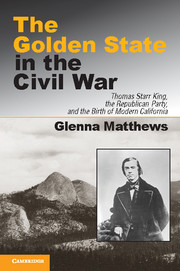 The Golden State in the Civil War
The Golden State in the Civil War Book contents
- Frontmatter
- Contents
- Preface and Acknowledgments
- Introduction
- 1 The Golden State in the 1850s
- 2 Thomas Starr King and the Massachusetts Background for His California Activism
- 3 Toward a Political Realignment
- 4 The First Years of War
- 5 The Military Front
- 6 The Cultural Front
- 7 A New Role for California Gold and a Seesaw Federal–State Relationship
- 8 “Coppery” California
- 9 Californians of Color
- 10 A Tragic Death and Its Aftermath
- Epilogue
- Index
- References
8 - “Coppery” California
Published online by Cambridge University Press: 05 April 2012
- Frontmatter
- Contents
- Preface and Acknowledgments
- Introduction
- 1 The Golden State in the 1850s
- 2 Thomas Starr King and the Massachusetts Background for His California Activism
- 3 Toward a Political Realignment
- 4 The First Years of War
- 5 The Military Front
- 6 The Cultural Front
- 7 A New Role for California Gold and a Seesaw Federal–State Relationship
- 8 “Coppery” California
- 9 Californians of Color
- 10 A Tragic Death and Its Aftermath
- Epilogue
- Index
- References
Summary
THE EVOLUTION OF NATIONAL POLICY
How seriously to take those who, while living in the North, dragged their feet about or openly resisted the Union cause during the Civil War was an ongoing problem for Abraham Lincoln. These were the people known as Copperheads – Lincoln referred to them as the “fire in the rear” – and their sometimes shadowy, sometimes very public existence challenged the judgment of many leaders. Making the situation especially tricky to negotiate was that there were Democrats who were clearly playing the role of a loyal opposition and others who were doing their best to undermine Northern morale in the interests of the Confederacy. When does criticism morph into treason? Put another way, were dissenters a nuisance or something worse? How could officials differentiate among people in the first and people in the second category? If they belonged to the latter, would it be best to chide them or actively punish them? How much should the Constitution be stretched – or ignored – in devising policy solutions to the dilemma?
Notwithstanding its being far away from the main scenes of battle, California had enough residents with a “coppery” hue – this was the term found repeatedly in contemporary correspondence to characterize Copperheads – that its leaders struggled with this set of issues as well. After all, Southern Democrats – the Chivs – had controlled the state's politics throughout the 1850s, and although some of them left for the Confederacy, most did not. In consequence, in the early stages of the war, with California's loyalty still in question, the state's military leaders revealed considerable anxiety about their capacity to maintain control should there be a concerted effort at rebellion.
- Type
- Chapter
- Information
- The Golden State in the Civil WarThomas Starr King, the Republican Party, and the Birth of Modern California, pp. 179 - 202Publisher: Cambridge University PressPrint publication year: 2012
